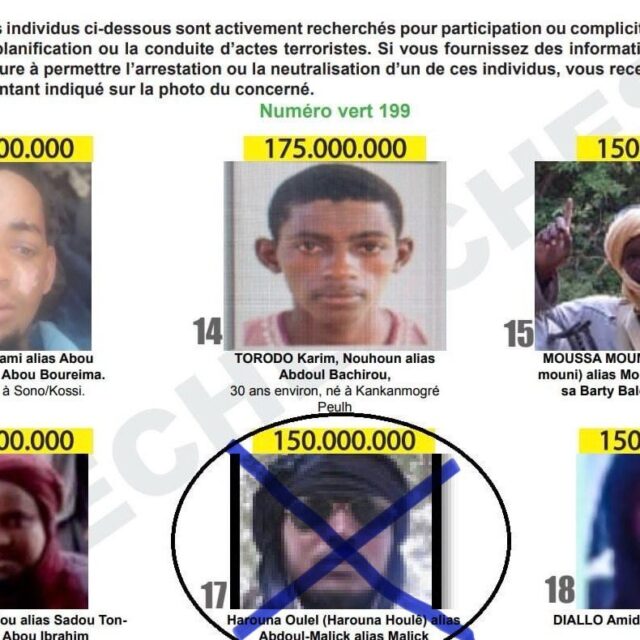
Abdel-Malick: ISGS’s Number Two Eliminated in Burkina Faso
Publication: Militant Leadership Monitor Volume: 15 Issue: 2
By:

Executive Summary
- Burkina Faso’s Air Force killed Islamic State in the Greater Sahara’s second highest-ranking member, Harouna Oulel (alias Abdel-Malick), in an air strike on a convoy the militant was leading in January 2024. This represents a rare victory for Burkina Faso’s counter-terrorism efforts, and a sign that the Burkinabe Air Force’s recent modernization campaign allows it to strike jihadists more effectively.
- Despite the fact that Islamic State in the Greater Sahara (ISGS) is falling behind its al-Qaeda-affiliated rival Group for Supporters of Islam and Muslims (JNIM) and it has lost many of its key leaders since 2022, the group continues to be a significant threat in the Sahel.
Islamic State in the Greater Sahara (ISGS) continues to be a significant threat in the Sahel. Even while ISGS is falling behind its al-Qaeda-affiliated rival Group for Supporters of Islam and Muslims (JNIM), it represents a threat that should not be discounted despite the loss of the group’s main leaders. ISGS founder Abu Adnan Walid al-Sahrawi was killed in 2022. Not long afterward, his deputy, Abdelhakim al-Sahrawi, was also killed (The Africa Report, September 22, 2021). On January 24, the group’s second highest-ranking member, Harouna Oulel (alias Abdel-Malick), was also killed.
Abdel-Malick reflected the “new generation” of ISGS leaders because, according to the Burkinabe government’s “Most Wanted” list, he was a Fulani—a trans-Sahelian semi-sedentary population which faces discrimination and stigmatization by the region’s governments (Burkina24, January 23). In contrast, the previous two leaders (both with the surname al-Sahrawi) were from Western Sahara and had previously operated in Algeria before migrating down to the Sahel. In the previous cases, it was only after this that they integrated with Fulanis and other Sahelian ethnic groups to form the brigades that eventually merged into ISGS in 2015.
Over time, however, Fulanis like Abdel-Malick have moved into the leadership ranks of ISGS. Abdel-Malick eventually became sufficiently prominent to induce the Burkinabe government to offer a 150,000,000 CFA (around $250,000) reward for his capture (Burkina24, January 23). Abdel-Malick was from a small village in northern Burkina Faso, where ISGS’s influence in the country is at its greatest. Given this, it is also unsurprising that he was targeted for recruitment by Abdelhakim al-Sahrawi and then designated as the commander for Gountouré-Gnégné Commune in Déou Department (Modern Ghana, January 25). In that location, he specialized in kidnappings and weapons training (X/@SimNasr, December 22, 2022). Abu Adnan Walid al-Sahrawi also married a Fulani woman from northern Burkina Faso, which helped ISGS consolidate a foothold in that area. The marriage also evidenced his and ISGS’s interest in recruiting Fulanis to their cause (The Africa Report, February 12, 2020).
Abdel-Malick commanded senior ISGS fighters despite his relative youth. He met his demise leading a convoy of fighters in northern Burkina Faso. While Abdel-Malick’s fighters stopped to rest, the Burkinabe air force bombarded the militant convoy—Abdel-Malick was among the casualties (X/@ZagazOlamakama, January 24). Abdel-Malick appears to have underestimated the Burkinabe Air Force’s upgrades since 2023, including their procurement of more advanced drone technology. These improvements allow the Burkinabe military to strike jihadists in ways not previously possible (Times Aerospace, August 17, 2023).
Burkinabe forces appear to have targeted this particular convoy for several reasons. In addition to Abdel-Malick’s presence, one truck was carrying weapons and equipment from the ISGS stronghold of Ouadalan. This convoy was likely part of an effort to expand the war between ISGS and Burkina Faso to a new front.
ISGS, like JNIM, has been rapidly moving from the Burkina Faso–Niger–Mali “tri-border region” towards the interior of Burkina Faso and coastal West Africa. As a result, the Burkinabe government considers Abdel-Malick’s death the first step towards retaking the country’s territory (RFI, January 24). While this may be overly optimistic, eliminating Abdel-Malick represents a rare success for Burkina Faso’s counter-terrorism efforts.



